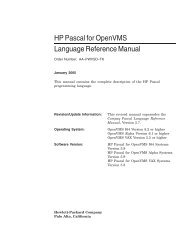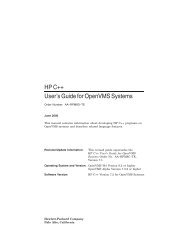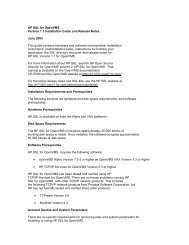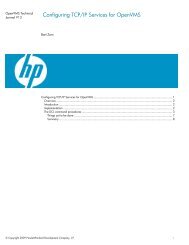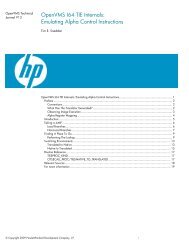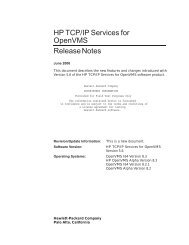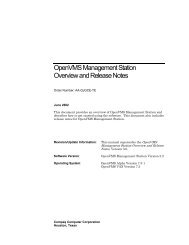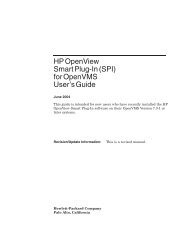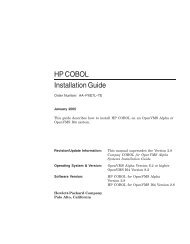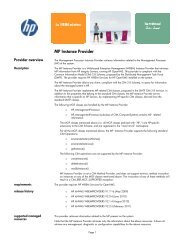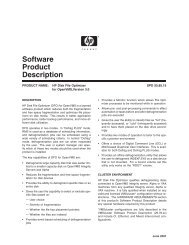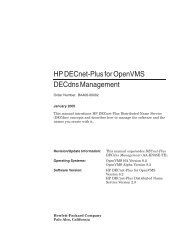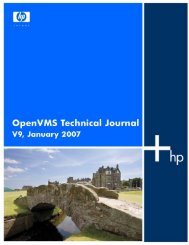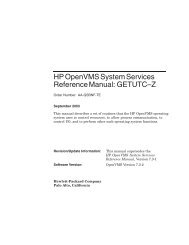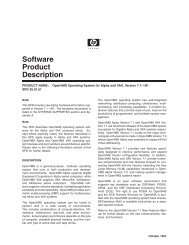OpenVMS Cluster Systems - OpenVMS Systems - HP
OpenVMS Cluster Systems - OpenVMS Systems - HP
OpenVMS Cluster Systems - OpenVMS Systems - HP
Create successful ePaper yourself
Turn your PDF publications into a flip-book with our unique Google optimized e-Paper software.
Maintaining an <strong>OpenVMS</strong> <strong>Cluster</strong> System<br />
10.6 Controlling OPCOM Messages<br />
10.6.1 Overriding OPCOM Defaults<br />
Table 10–3 shows how to define the following system logical names in the<br />
command procedure SYS$MANAGER:SYLOGICALS.COM to override the<br />
OPCOM default states.<br />
Table 10–3 OPCOM System Logical Names<br />
System Logical Name Function<br />
OPC$OPA0_ENABLE If defined to be true, OPA0: is enabled as an operator console. If defined to be<br />
false, OPA0: is not enabled as an operator console. DCL considers any string<br />
beginning with T or Y or any odd integer to be true, all other values are false.<br />
OPC$OPA0_CLASSES Defines the operator classes to be enabled on OPA0:. The logical name can be<br />
a search list of the allowed classes, a list of classes, or a combination of the<br />
two. For example:<br />
$ DEFINE/SYSTEM OP$OPA0_CLASSES CENTRAL,DISKS,TAPE<br />
$ DEFINE/SYSTEM OP$OPA0_CLASSES "CENTRAL,DISKS,TAPE"<br />
$ DEFINE/SYSTEM OP$OPA0_CLASSES "CENTRAL,DISKS",TAPE<br />
You can define OPC$OPA0_CLASSES even if OPC$OPA0_ENABLE is not<br />
defined. In this case, the classes are used for any operator consoles that are<br />
enabled, but the default is used to determine whether to enable the operator<br />
console.<br />
OPC$LOGFILE_ENABLE If defined to be true, an operator log file is opened. If defined to be false, no<br />
log file is opened.<br />
OPC$LOGFILE_CLASSES Defines the operator classes to be enabled for the log file. The logical name<br />
can be a search list of the allowed classes, a comma-separated list, or a<br />
combination of the two. You can define this system logical even when the<br />
OPC$LOGFILE_ENABLE system logical is not defined. In this case, the<br />
classes are used for any log files that are open, but the default is used to<br />
determine whether to open the log file.<br />
OPC$LOGFILE_NAME Supplies information that is used in conjunction with the default name<br />
SYS$MANAGER:OPERATOR.LOG to define the name of the log file. If the<br />
log file is directed to a disk other than the system disk, you should include<br />
commands to mount that disk in the SYLOGICALS.COM command procedure.<br />
10.6.2 Example<br />
The following example shows how to use the OPC$OPA0_CLASSES system<br />
logical to define the operator classes to be enabled. The following command<br />
prevents SECURITY class messages from being displayed on OPA0.<br />
$ DEFINE/SYSTEM OPC$OPA0_CLASSES CENTRAL,PRINTER,TAPES,DISKS,DEVICES, -<br />
_$ CARDS,NETWORK,CLUSTER,LICENSE,OPER1,OPER2,OPER3,OPER4,OPER5, -<br />
_$ OPER6,OPER7,OPER8,OPER9,OPER10,OPER11,OPER12<br />
In large clusters, state transitions (computers joining or leaving the cluster)<br />
generate many multiline OPCOM messages on a boot server’s console<br />
device. You can avoid such messages by including the DCL command<br />
REPLY/DISABLE=CLUSTER in the appropriate site-specific startup command<br />
file or by entering the command interactively from the system manager’s<br />
account.<br />
10.7 Shutting Down a <strong>Cluster</strong><br />
The SHUTDOWN command of the SYSMAN utility provides five options for<br />
shutting down <strong>OpenVMS</strong> <strong>Cluster</strong> computers:<br />
• NONE (the default)<br />
• REMOVE_NODE<br />
10–10 Maintaining an <strong>OpenVMS</strong> <strong>Cluster</strong> System



